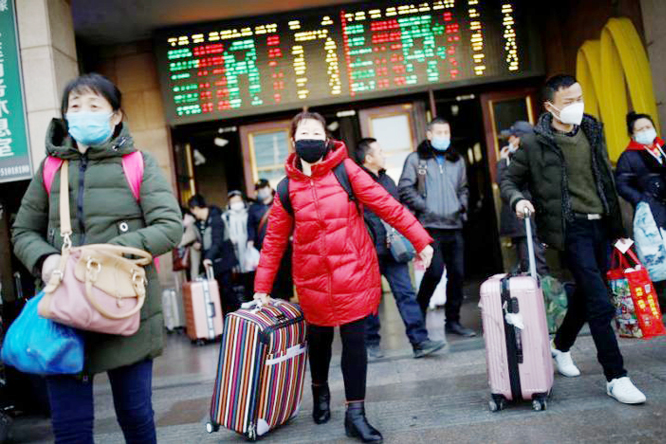
Reuters, Jakarta :
The coronavirus outbreak has stoked a wave of anti-China sentiment around the globe, from shops barring entry to Chinese tourists, online vitriol mocking the country’s exotic meat trade and surprise health checks on foreign workers.
The virus, which originated in China, has spread to more than a dozen countries, many of them in Southeast Asia which has sensitive relations with China amid concerns about Beijing’s vast infrastructure spending and political clout in the region and sovereignty disputes in the South China Sea.
Authorities and schools in Toronto, Canada, were moved to warn against discrimination towards Chinese Canadians, while in Europe there was anecdotal evidence of Chinese residents facing prejudice in the street, and hostile newspaper headlines.
“Orientalist assumptions plus political distrust plus health concerns are a pretty powerful combination,” said Charlotte Setijadi, and anthropologist who teaches at Singapore Management University.
Chinese authorities have said the virus emerged from a market selling illegally traded wildlife, giving rise to widespread social media mocking of China’s demand for exotic delicacies and ingredients for traditional medicine.
“Stop eating bats,” said one Twitter user in Thailand, the top destination for Chinese tourists. “Not surprising that the Chinese are making new diseases,” another Thai user posted alongside a video clip that showed a man eating raw meat.
“Because your country is beginning (to) spread disease…we do not accept to serve the guest from China,” read a sign in English outside the Danang Riverside hotel in the central Vietnamese city of the same name. Authorities later told the hotel to remove the sign, its manager said in a Facebook post.
Vietnam, which was under Chinese occupation centuries ago and contests Beijing’s sweeping maritime claims in the South China Sea, has particularly fraught relations with China.
But it is not alone in the region.
Over 60% of respondents to a poll of Southeast Asian officials, academics and other professionals said in a survey this month that they distrusted China. Nearly 40% said they thought China was “a revisionist power and intends to turn Southeast Asia into its sphere of influence”. The survey did not mention the virus.
The Chinese government said it was determined to contain an epidemic it called a “common challenge facing mankind”.
“Prejudice and narrow-minded words are no good at all,” the Foreign Ministry said in a statement.
The coronavirus outbreak has stoked a wave of anti-China sentiment around the globe, from shops barring entry to Chinese tourists, online vitriol mocking the country’s exotic meat trade and surprise health checks on foreign workers.
The virus, which originated in China, has spread to more than a dozen countries, many of them in Southeast Asia which has sensitive relations with China amid concerns about Beijing’s vast infrastructure spending and political clout in the region and sovereignty disputes in the South China Sea.
Authorities and schools in Toronto, Canada, were moved to warn against discrimination towards Chinese Canadians, while in Europe there was anecdotal evidence of Chinese residents facing prejudice in the street, and hostile newspaper headlines.
“Orientalist assumptions plus political distrust plus health concerns are a pretty powerful combination,” said Charlotte Setijadi, and anthropologist who teaches at Singapore Management University.
Chinese authorities have said the virus emerged from a market selling illegally traded wildlife, giving rise to widespread social media mocking of China’s demand for exotic delicacies and ingredients for traditional medicine.
“Stop eating bats,” said one Twitter user in Thailand, the top destination for Chinese tourists. “Not surprising that the Chinese are making new diseases,” another Thai user posted alongside a video clip that showed a man eating raw meat.
“Because your country is beginning (to) spread disease…we do not accept to serve the guest from China,” read a sign in English outside the Danang Riverside hotel in the central Vietnamese city of the same name. Authorities later told the hotel to remove the sign, its manager said in a Facebook post.
Vietnam, which was under Chinese occupation centuries ago and contests Beijing’s sweeping maritime claims in the South China Sea, has particularly fraught relations with China.
But it is not alone in the region.
Over 60% of respondents to a poll of Southeast Asian officials, academics and other professionals said in a survey this month that they distrusted China. Nearly 40% said they thought China was “a revisionist power and intends to turn Southeast Asia into its sphere of influence”. The survey did not mention the virus.
The Chinese government said it was determined to contain an epidemic it called a “common challenge facing mankind”.
“Prejudice and narrow-minded words are no good at all,” the Foreign Ministry said in a statement.

